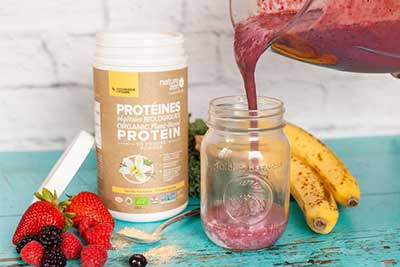Protein powders have become a popular staple in the world of fitness and nutrition, offering a convenient way to supplement protein intake. While whey protein has long dominated the market, plant protein powders are gaining recognition for their health benefits and suitability for various dietary preferences. In this blog post, we will unveil 15 plant protein powders that may not have crossed your radar before.
From nutrient-dense superfoods to lesser-known plant sources, these protein powders provide a wealth of essential amino acids, vitamins, and minerals to support your fitness goals and overall well-being. Get ready to explore an array of exciting plant-based protein options that will take your nutrition to the next level. Whether you’re a vegan, vegetarian, or simply looking to diversify your protein sources, these 15 plant protein powders will surprise and delight you with their impressive nutritional profiles. Let’s dive in and uncover the power of these lesser-known plant protein powders that you might not have known about.
Atheletes who are Vegan
There is a growing trend of professional athletes adopting plant-based diets for various reasons, including ethical concerns, environmental sustainability, and potential health benefits. Many athletes have shared their experiences and success stories of thriving on plant-based diets. Here are a few examples of professional athletes who have embraced plant-based eating:
- Novak Djokovic: The renowned tennis player switched to a plant-based diet in 2011 and has since credited it with improving his performance and overall well-being.
- Lewis Hamilton: The Formula 1 champion adopted a plant-based diet in 2017 and has since been vocal about the positive impact it has had on his energy levels and recovery.
- Serena Williams: The legendary tennis player has experimented with plant-based eating and has often mentioned incorporating plant-based meals into her training regimen.
- Cam Newton: The NFL quarterback has followed a plant-based diet during the offseason to aid in recovery and maintain optimal health.
- Alex Morgan: The professional soccer player, known for her accomplishments with the U.S. Women’s National Team, has shared her experience of adopting a plant-based diet to support her athletic performance.
These are just a few examples, and there are many more athletes across various sports who have chosen plant-based diets and found success. By exploring reputable sports news websites and publications, you can find in-depth articles and interviews that highlight the experiences and perspectives of athletes who have embraced plant-based eating.
There are several Indian athletes who have adopted plant-based diets. Here are a few notable examples:
- Virat Kohli: The Indian cricket captain has embraced a plant-based diet since 2018. He has cited ethical and health reasons for his switch and has spoken about the positive impact it has had on his fitness and performance.
- Sunil Chhetri: The captain of the Indian national football team, Sunil Chhetri, follows a primarily plant-based diet. He has emphasized the importance of nutrition and has spoken about incorporating plant-based foods into his meals.
- PV Sindhu: The badminton superstar PV Sindhu has incorporated plant-based foods into her diet. While not completely vegetarian, she focuses on consuming a balanced diet that includes a variety of plant-based protein sources.
- Hima Das: The track and field athlete Hima Das, known as the “Dhing Express,” follows a predominantly vegetarian diet and includes plant-based protein sources to meet her nutritional needs.
These Indian athletes have recognized the benefits of plant-based eating and have made conscious choices to incorporate plant-based foods into their diets. Their experiences highlight the growing awareness of plant-based nutrition within the Indian sports community.
Note: Celebs may change their stance at any given instance. This is a list as per research and statements made by them.
Why are Atheletes turning to Plant Based Diet?

Professional athletes are choosing to switch to plant-based diets for various reasons, including:
- Enhanced Performance: Many athletes report improved performance after adopting a plant-based diet. Plant-based diets can provide a wide range of essential nutrients, including carbohydrates, proteins, healthy fats, vitamins, and minerals, which can support energy levels, endurance, and overall athletic performance.
- Quicker Recovery: Plant-based diets often contain high amounts of antioxidants and anti-inflammatory compounds found in fruits, vegetables, and whole grains. These components can aid in reducing inflammation, promoting faster recovery, and minimizing oxidative stress on the body.
- Reduced Inflammation: Animal products, particularly those high in saturated fats, may contribute to inflammation in the body. Plant-based diets, on the other hand, tend to be lower in saturated fats and higher in anti-inflammatory nutrients, which may help athletes manage inflammation and support optimal recovery.
- Health and Well-being: Plant-based diets are associated with various health benefits, such as reduced risk of heart disease, obesity, and certain types of cancer. By prioritizing whole plant foods, athletes can support their long-term health and overall well-being.
- Environmental and Ethical Considerations: Some athletes choose plant-based diets due to concerns about animal welfare and the environmental impact of animal agriculture. Plant-based diets have a smaller carbon footprint and can contribute to a more sustainable food system.
It’s important to note that athletes who switch to plant-based diets must carefully plan their meals to ensure they meet their nutrient needs, particularly in terms of protein, iron, calcium, and vitamin B12. Working with registered dietitians or sports nutritionists can help athletes create well-balanced plant-based eating plans that support their specific athletic goals.
Does vegan protein powder contain amino acids?
Yes, vegan protein powders do contain amino acids. Amino acids are the building blocks of protein, and they are present in all sources of protein, including plant-based sources. Vegan protein powders are typically made from plant sources such as peas, rice, hemp, or soy, among others. While different plant-based protein sources may have varying amino acid profiles, when combined or consumed as part of a varied diet, they can provide all the essential amino acids required by the body.
To ensure a complete amino acid profile, some vegan protein powders may be formulated by combining different plant protein sources. For example, a blend of pea protein and rice protein can provide a more balanced amino acid profile similar to that of animal-based protein sources.
It’s important to note that consuming a diverse range of plant-based protein sources, including vegan protein powders, along with a well-rounded diet, can help meet the body’s amino acid needs and support overall health and well-being. For more details about animal and plant protein differences, check THIS.
Let’s Finally Get Down to List of 15 Plant Protein Powders
In India, some of the most common plant protein powders available are:
- Pea Plant Protein Powders: Pea protein powder is widely available in India and is a popular choice among individuals following a plant-based diet. It is easily digestible and provides a good amount of protein.
- Soy Protein Powder: Soy protein powder is another common option in India. Soybeans are a traditional protein source in Indian cuisine, and soy protein powder offers a complete amino acid profile.
- Rice Protein Powder: Rice protein powder, derived from brown rice, is gaining popularity in India. It is hypoallergenic and suitable for individuals with dietary restrictions or sensitivities.
- Hemp Seed Protein Powder: Hemp seed protein powder is also available in India. It offers a good balance of essential amino acids and is rich in omega-3 fatty acids.
- Moringa Protein Powder: Moringa is a native plant in India, and its protein powder is gaining recognition for its nutritional benefits. Moringa protein powder is packed with essential amino acids, antioxidants, and vitamins.
- Sacha Inchi Protein Powder: Derived from the seeds of the sacha inchi plant, this protein powder is rich in essential amino acids, omega-3 fatty acids, and fiber. It has a mild, nutty flavor and is easily digestible.
- Pumpkin Seed Protein Powder: Made from ground pumpkin seeds, this protein powder is a great source of complete protein, providing all essential amino acids. It also contains minerals like magnesium, iron, and zinc.
- Quinoa Protein Powder: Quinoa is not only a nutritious grain but also a fantastic plant-based protein source. Quinoa protein powder is gluten-free, easy to digest, and packed with all essential amino acids.
- Watermelon Seed Protein Powder: Watermelon seeds are surprisingly rich in protein. Watermelon seed protein powder is a unique option that offers a good amino acid profile, along with minerals like magnesium, iron, and zinc.
- Chia Seed Protein Powder: Chia seeds are well-known for their omega-3 fatty acid content, but they also provide protein. Chia seed protein powder offers a good amount of plant-based protein, dietary fiber, and antioxidants.
- Sunflower Seed Protein Powder: Sunflower seeds are not only tasty but also a good source of protein. Sunflower seed protein powder contains essential amino acids and provides additional nutrients like vitamin E and minerals.
- Spirulina Protein Powder: Spirulina is a type of blue-green algae that offers a complete protein source, along with a wide range of vitamins, minerals, and antioxidants. Spirulina protein powder is highly nutritious and suitable for those looking for a plant-based protein option.
- Flaxseed Protein Powder: Flaxseeds are a rich source of omega-3 fatty acids and dietary fiber. Flaxseed protein powder provides a moderate amount of protein along with essential amino acids, making it a valuable addition to a plant-based diet.
- Algae Protein Powder: Algae, such as chlorella and spirulina, are protein-packed superfoods. Algae protein powder offers a complete protein profile, vitamins, minerals, and antioxidants, providing a nutrient-dense option for plant-based protein supplementation.
- Amaranth Protein Powder: Amaranth is a gluten-free pseudo-grain that boasts a high protein content. Amaranth protein powder is easily digestible, contains essential amino acids, and is rich in minerals like iron, calcium, and magnesium.
For details on plant protein powders available in India (brandwise) – visit THIS.
Are there any other benefits of Plant Protein Powders?
- The Role of Plant Protein Powders in Weight Management
Incorporating plant protein powders into your diet can be beneficial for weight management. Plant protein powders are often lower in calories and fat compared to their animal-based counterparts, making them a suitable option for individuals looking to maintain or lose weight. These powders can help increase satiety, reduce cravings, and support muscle recovery and growth, all of which are important factors in achieving and maintaining a healthy weight. Additionally, plant protein powders can be easily incorporated into smoothies, shakes, or baked goods, providing a convenient and satisfying way to enhance your protein intake while managing your weight.
- Plant Protein Powders for Gut Health and Digestive Wellness
Maintaining a healthy gut is crucial for overall well-being, and plant protein powders can contribute to gut health and digestive wellness. Many plant protein powders, such as pea protein and hemp protein, contain dietary fiber, which plays a vital role in supporting a healthy digestive system. Fiber promotes regular bowel movements, aids in the growth of beneficial gut bacteria, and helps prevent digestive issues like constipation. Choosing plant protein powders that are minimally processed and free from artificial additives can further support gut health by reducing the intake of potential irritants. By prioritizing plant protein powders that promote digestive wellness, you can nourish your body while also taking care of your gut.
- Plant Protein Powders as a Sustainable Choice for the Planet
The environmental impact of food choices has gained significant attention in recent years, and opting for plant protein powders can be a sustainable choice for the planet. Animal agriculture is a significant contributor to greenhouse gas emissions, deforestation, and water pollution. In contrast, plant-based protein powders require fewer resources and have a lower carbon footprint. By choosing plant protein powders, you can reduce your ecological footprint and contribute to a more sustainable food system. Additionally, supporting companies that prioritize sustainable sourcing practices and packaging materials can further enhance the environmental benefits of plant protein powders. By incorporating these eco-friendly options into your fitness and nutrition routine, you can align your dietary choices with your commitment to protecting the planet.






